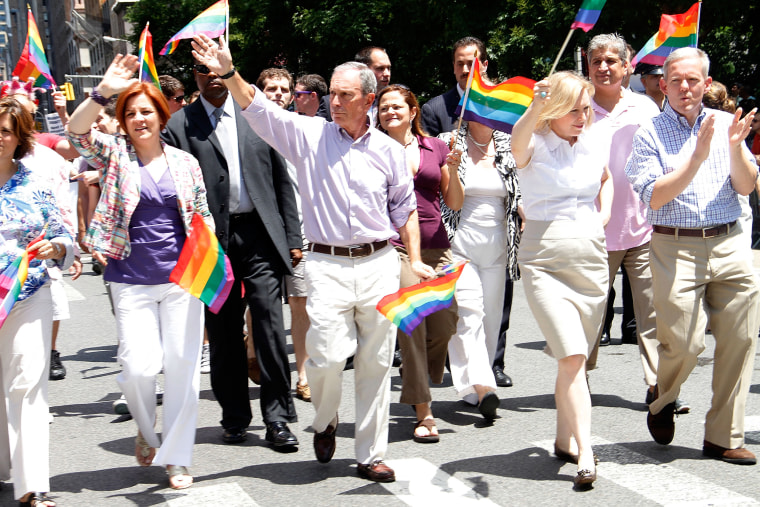Mike Bloomberg, the former New York City mayor and a Democratic presidential hopeful, on Tuesday outlined his LGBTQ policy platform ahead of next week's Iowa caucuses, saying "expanding rights is what makes people want to live in America.”
Bloomberg’s plan promises to “reverse the multitude of policy setbacks to LGBTQ+ Americans under the Trump administration” by focusing on workplace equality, disparities in health care, protecting youth and families, and ending violence.
"I have been honored to stand with the LGBTQ+ community in the fight for equality and justice, from New York, where we won marriage equality in 2011, to states across the country,” Bloomberg said in a statement. “That fight — true to our nation's highest ideals — has achieved historic progress, but we still have a long way to go.”
In a phone call with reporters Tuesday afternoon, Bloomberg touted America’s growing embrace of the LGBTQ community as part of what makes the country so appealing.
During the call, Bloomberg and his campaign listed his LGBTQ accomplishments during his 2002-2013 tenure as mayor of New York City, including expanding anti-discrimination policy to include gender identity in addition to sexual orientation, establishing a commission to address LGBTQ homelessness, and mandating that public hospitals perform comprehensive LGBTQ training.
The billionaire businessman-turned-politician also touted his financial and political assistance to marriage equality fights in Maryland, Washington state and Maine, all of which legalized same-sex marriage prior to the 2015 Obergefell v. Hodges decision that swept away remaining gay marriage bans. Bloomberg noted his early 2005 endorsement of same-sex marriage, saying he later “worked to convince Republicans” to vote for the marriage equality bill passed by the New York State Assembly in 2011.
In addition to unveiling the LGBTQ platform, his campaign also announced endorsements from two prominent gay fashion leaders, former “Project Runway” judge Tim Gunn and designer and performer Isaac Mizrahi, who both joined Bloomberg’s National LGBTQ+ Leadership Council.
While several of Bloomberg's LGBTQ policy points are borrowed from the much more specific business and economic policy sections of his platform — like a vow to invest “billions in communities across the nation to help create jobs and grow incomes” — in many ways, the LGBTQ platform mirrors those of other Democratic presidential hopefuls, highlighting how the party has coalesced around a general platform on lesbian, gay, bisexual, transgender and queer rights.
For instance, former Vice President Joe Biden, former Mayor Pete Buttigieg of South Bend, Indiana, Sen. Elizabeth Warren of Massachusetts, Sen. Bernie Sanders of Vermont and Bloomberg all promise to sign the Equality Act and to undo the Trump administration’s transgender military ban. Many of the specific promises contained in the candidates’ platforms would be addressed if the Equality Act were to ever be signed into law.
Like Bloomberg’s, each of the candidates’ LGBTQ platforms borrows a bit from other parts of their overall general electorate pitch. Sanders’ LGBTQ platform, for example, states that "Medicare for All" would “cover gender affirming surgeries, increase access to PrEP, remove barriers to mental health care and bolster suicide prevention efforts.”
Biden, notably, has not unveiled his promised LGBTQ policy platform.
Several candidates have made extensive efforts to appeal directly to the LGBTQ community in advance of the 2020 Democratic presidential nomination, when 4 million LGBTQ Democrats will be eligible to vote, according to a Williams Institute study.
There have been two separate events dedicated to LGBTQ issues: a town hall in Iowa and a larger forum in California. Warren even took an unconventional approach by setting up a canvassing booth at the popular RuPaul’s DragCon drag queen convention last year. The Massachusetts senator also made waves in October with her viral response to a question about how she would respond to a potential voter who said he believes marriage is “between one man and one woman.”
“I’m going to say then just marry one woman — I’m cool with that,” Warren said, pausing for comedic effect. “Assuming you can find one.”




